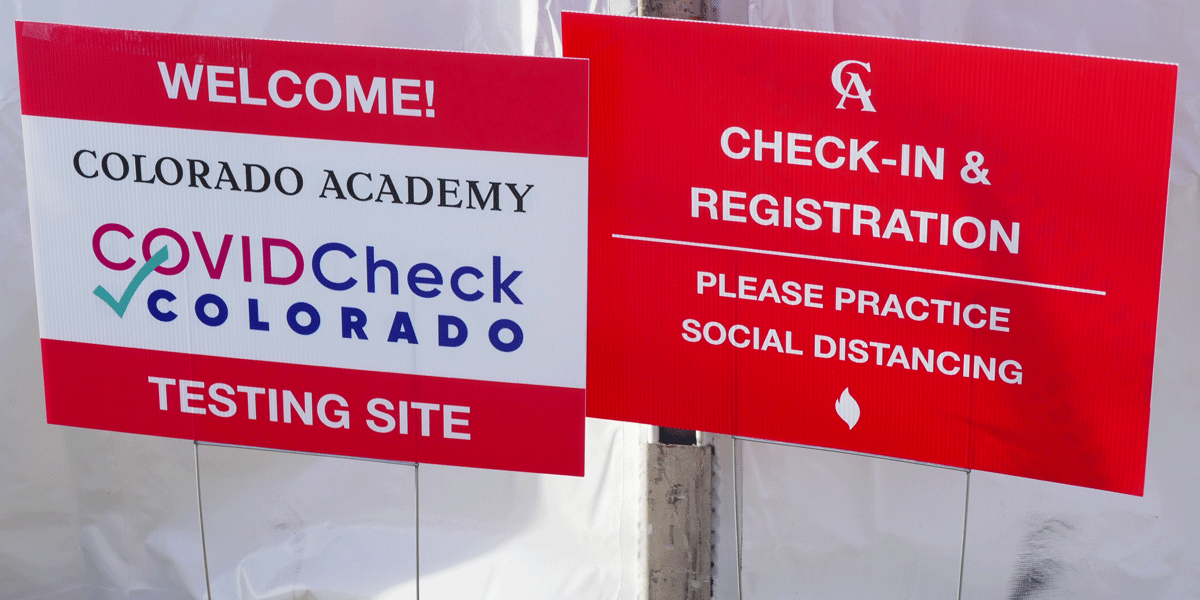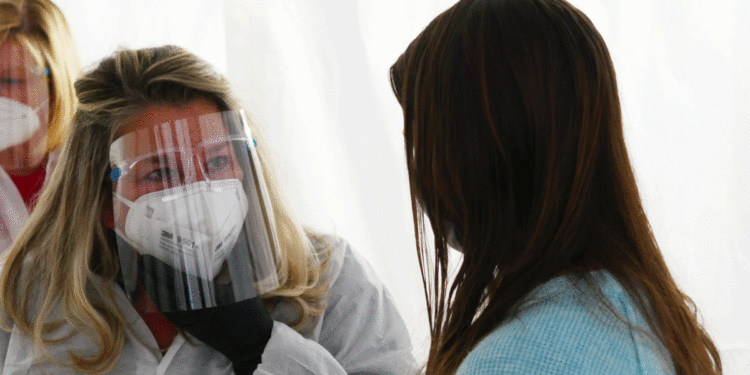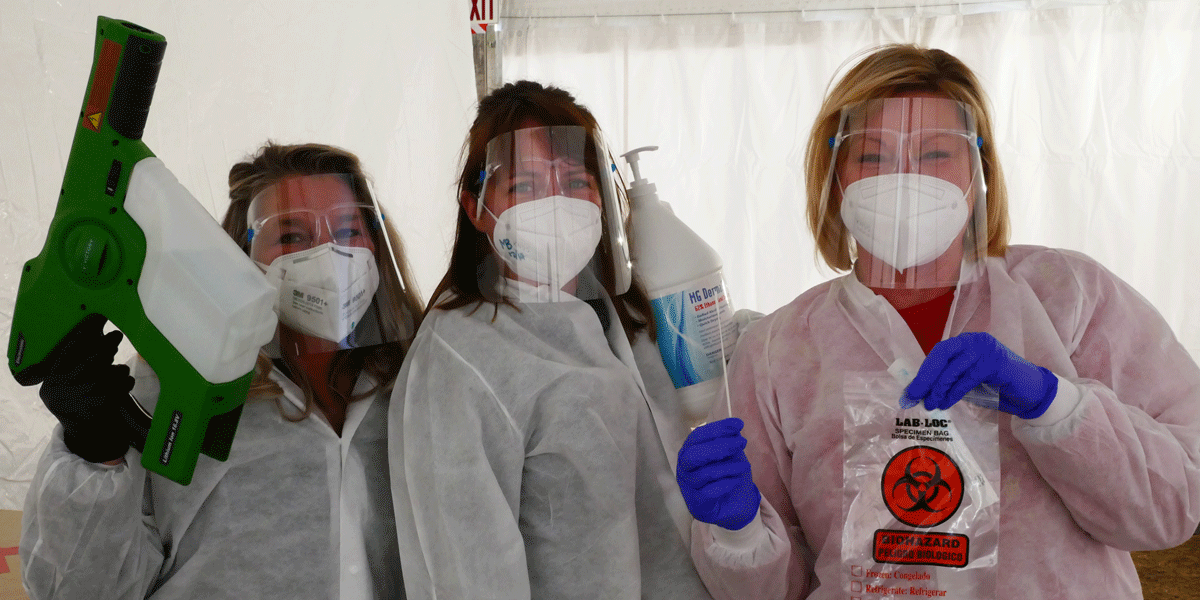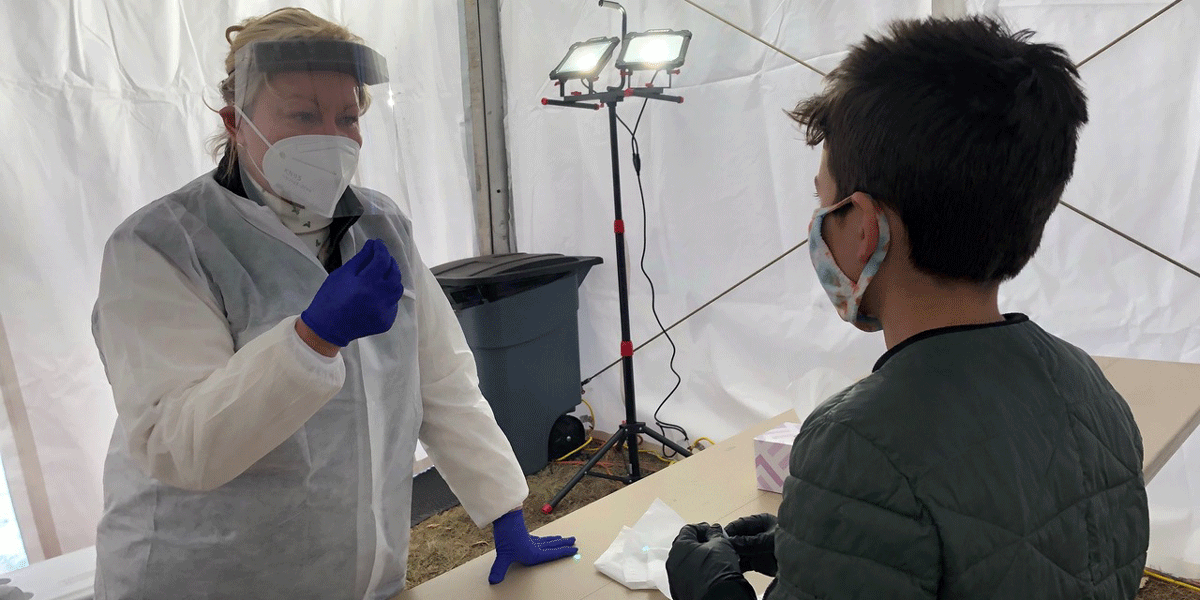“Bubbles don’t count,” says Colorado Academy Health Assistant Mandy Batliner, explaining to the student volunteers at the COVIDCheck Colorado (CCC) testing tent on CA’s campus. Some 60 Middle and Upper School students took part in a trial run of the testing program to help the school determine how to streamline it and implement the program beginning in the new calendar year.
For months, CA has been in partnership with CCC to provide frequent on-site COVID-19 testing for faculty and staff, as well as free off-site testing for families who need it. CCC is a social benefit enterprise of Gary Community Investments. They have helped to test more than a quarter of a million people in the Denver area and have prevented thousands of COVID-19 outbreaks. As an added health protocol to help bring more students back to campus, CA is partnering with CCC to launch a student program on campus, beginning January 4, 2021, to provide serial saliva testing of Middle and Upper Schoolers. Parents will receive more information about registering and testing via email.

A model for thousands of districts across the state
Using the SalivaDirect PCR test, CA endeavors to complete two consecutive baseline tests of all Middle and Upper School students in January, followed by 50 percent of students each week thereafter. “Based on a high percentage of participation, a positivity rate of below 5 percent, and more favorable conditions at the county level, this is a mechanism that may help restore more of our in-person learning,” says Head of School Dr. Mike Davis.
“There is no single metric that determines a return to in-person learning, but we know that in the broader community, higher case counts and higher positivity rates are an indicator that there is just more virus circulating out there. When we can measure those and effectively bring them down through our efforts, we can increase confidence about bringing kids back,” he says. “The fallacy that we are driving positivity rates up by testing more needs to be addressed. A slowdown in testing doesn’t mean that we are making COVID-19 go away.”
Experts at National Jewish Health say, in fact, as CA rolls out this program, the school is likely to see more cases, because testing will detect some of those who are asymptomatic and could be spreading the virus. The U.S. Centers for Disease Control and Prevention estimates asymptomatic carriers make up 40-50 percent of the people who have COVID-19. “The testing program makes us safer,” says Davis.
According to CCC, “Colorado Academy is the first K-12 site to administer the saliva collection on an independently run basis.” CCC representatives say, “Colorado Academy’s ability to deliver the test with fidelity and ease will serve as a model for thousands of districts across the state, as we work with districts and schools to ensure they have the most equitable and innovative response to COVID-19 and bringing kids back to in-person learning.” Lower School students have been fully in-person and on campus since the fall. Not only is the saliva testing more difficult with younger children, but Lower School-aged children are known to have lower rates of COVID-19 illness and lower rates of transmission.

‘Just think of sour candy’
Back in the testing tent, students arrive at the check-in table and get full instructions on how much saliva is needed in the test tube (.5ml or about 1/3 of the way full in the small testing tube), and how, as opposed to spit, it is more like drool; it is the pooling of saliva in the mouth that the testing team is after.
“Just think of your favorite foods, or sour foods like Sour Patch candy, Skittles, doughnuts, or French fries,” the health staff encourages the students.” Some of the volunteers have some advice for their classmates soon to be taking part in the program. “It’s not scary or anything. You just think of sour candy,” says Sixth Grader Cameron Neubauer.
“Be patient, because it takes longer than you think,” says Eighth Grader River Hamm. “This is a lot harder than it looks,” adds Tenth Grader Dori Beck, who was in a race with Junior Oliver Dean to deposit the correct amount in the tube.
While it may take a few minutes longer, the SalivaDirect PCR test is considered less invasive than the nasal swab PCR that many are familiar with. Additionally, of benefit for CA is that the saliva tests are processed locally and don’t require overnight shipping to labs in other parts of the country. Results are usually delivered in a matter of hours, instead of days, providing a more real-time picture of the prevalence of the virus among the people in the campus community.
CCC sites across Denver began offering the option of SalivaDirect tests in late December. It is especially helpful for those seeking faster test results or for those who cannot tolerate the nasal swab test. It is also economical; while CCC and CDPHE have been absorbing much of the cost of testing, processing of the saliva tests relies on commonly used enzymes, as well as PCR technology currently used by other COVID-19 tests, according to researchers at Yale University, where the test was developed. The commonly used enzymes prevent reliance upon specialized reagents, say Yale researchers.

‘We want prom and graduation’
The Food and Drug Administration (FDA) has given emergency use authorization (EUA) to SalivaDirect, for diagnostic purposes. It was quickly adopted by the NBA as a quick and easy way to test asymptomatic players daily. According to Yale, “Players and staff received routine testing every two days with a combined nasal and oral swab, then had the choice of providing a saliva sample for Yale to study.”
The researchers point out that this kind of frequent testing is ideal to help stop outbreaks in any situation where people “cannot maintain six feet of social distancing—this could be especially relevant to essential workers and students returning to school.”
Student volunteer, CA Senior Kiah May, says, “I’ll spit in a tube every day” if this helps us get us back to school. I am 100 percent on board with that.” May says having all Seniors back on campus is an important goal. “That is all we want…. We haven’t seen each other in eight months.” May’s mother is a physician, and so with possible exposures, her family is tested frequently. “I’ve been tested 27 times,” says the Senior. “We want to help keep the school safe.”
She says with the introduction of the COVID-19 vaccine, she is hopeful that the second half of the year might include some of CA’s annual traditions that Seniors look forward to. “We want prom and graduation.” Regardless, May knows that the students will make it through what has been an unusual and difficult year.
“As a grade, we are going to have this experience—that we survived a pandemic together. All of us realize that, as bad as it is right now, we’re going to get through it.”
